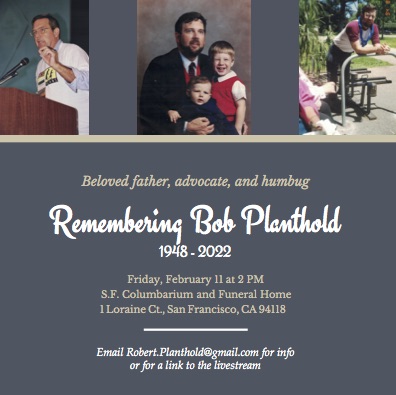By Rebecca Rosen : beyondchron – excerpt

Planthold Memorial Invitation
(Editor’s Note: Bob Planthold, a longtime Beyond Chron contributor and transit and disability activist, recently died in San Francisco. Senior Beat’s Rebecca Rosen-Lum wrote a great tribute to Planthold last August that we repost with permission. You can find Bob’s letters and stories in Beyond Chron by entering “Planthold” in our search box. He will truly be missed)…
A friend said that to understand activist Bob Planthold one might be best advised to start by watching “Crip Camp,” the film backed by the Obamas’ Higher Ground Productions that documents the rise of the disability rights movement.
With its theme of “Nothing about us without us” – a protest against policy that affects the disabled but doesn’t seek their input – the journey mirrors Planthold’s own, from a growing awareness of the need for change to building alliances to move it along.
Planthold, 72, advocates for seniors, pedestrians and people with disabilities on transit issues and in assuring access to other resources. He participates in frequent meetings – easier now, with Zoom…
A legislative turning point – The high point of “Crip Camp” – and a turning point in Planthold’s life – was the federal Rehabilitation Act of 1973, a watershed piece of legislation, particularly the fight for section 504, mandating accessible public accommodation…
Organizing for change – Planthold has corralled comrades to push for changes in a number of areas…
Keeping it light – Lobbying can be a tough job but Planthold tries to keep it light…
Presumptions & prejudices – And if Planthold raises a strong voice for others with disabilities, he advocates as ardently for people with other needs – tapping into advocacy groups to craft effective alliances…
Working in the system – In 2008, he received the Mayor’s Disability Council Beacon Award for his service with the Sunshine Ordinance Task Force, the Ethics Commission, (going on 5) Civil Grand Juries, Bay Area Legal Aid, Senior Action Network, Disaster Preparedness, Public Transit and Pedestrian Safety Issues — as well as his many years of providing valuable input and advocacy before the Mayors Disability Council.
But he continues to wrangle with government over such issues as the proposed closure of JFK Drive in Golden Gate Park or the proliferation throughout the city of “parklets,” which swallow up lengths of sidewalk and street…
As Livingston said, “For us, the fight is never over.”…
(more)
We are sad and sorry to loose Bob. He was so incredibly helpful and determined. We appreciate his lifetime of dedication to the needs of others and his big heart. We will miss him as we continue our efforts to protect the vulnerable among.

